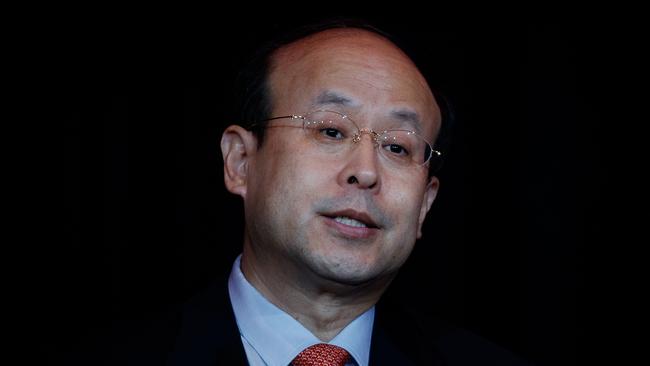‘Australian people pushed over abyss’: China’s warning

First, it is indisputable that Taiwan belongs to China. Taiwan has been an inalienable part of the Chinese territory since ancient times, which is clearly spelled out in Chinese historical documents and white papers of the Chinese government. As a great outcome of world’s anti-fascist war and one of the important cornerstones of the post-war international order, the 1943 Cairo Declaration and the 1945 Potsdam Proclamation clearly stipulated that Taiwan should be restored to China. Despite the protracted political confrontation between the two sides across the Taiwan Strait caused by the civil war in the late 1940s, China has never been divided, and the historical and legal facts that Taiwan is part of Chinese territory and both sides belong to the one and only China have never changed. At its 26th session in October 1971, the United Nations General Assembly adopted Resolution 2758, which settled once and for all the political, legal and procedural issues of China’s representation in the UN, and it covered the whole country, including Taiwan. It also spelled out that China has one single seat in the UN, so there is no such thing as “two Chinas” or “one China, one Taiwan”. In practice, Taiwan is referred to at the United Nations as “Taiwan, Province of China”.
Second, the Taiwan question is purely China’s internal affair, the core of China’s core interests and the first red line that must not be crossed. Taiwan is China’s Taiwan, and its resolution is entirely an internal affair of China, in which no external force is allowed to interfere. The recent elections in Taiwan are a local matter for China. We urge all countries that have established diplomatic relations with China to earnestly abide by the one-China principle, to refrain from developing any official relations or conducting any official contacts with the Taiwan region, to handle Taiwan-related questions prudently and properly, and to avoid sending any wrong signal to “Taiwan-independence” separatist forces. As for trumpeting the false narrative of “democracy vs authoritarianism”, it is essentially a way of dividing the international community according to their own interests, interfering in the internal affairs of other countries, and patching up small groupings in the name of democracy at the service of group politics and maintaining primacy. Such practices gravely violates the purposes and principles of the UN Charter, and contravenes and tramples on democracy as part of the common values of humanity.
Third, it is the “Taiwan independence” separatist forces and foreign anti-China forces that try to change the status quo across the Taiwan Straits and provoked the crisis. China’s non-commitment to renounce the use of force is precisely a fundamental deterrent to the “Taiwan independence” separatist forces and a fundamental guarantee for peace and stability across the Straits. The true status quo across the Taiwan Straits is that there is only one China in the world, Taiwan is part of China, and the Government of the People’s Republic of China is the sole legitimate government representing the whole of China. The DPP authorities in Taiwan have adopted a separatist stance, and colluded with external forces in successive provocative actions designed to divide the country. They are the culprit of changing the status quo across the Straits. Certain countries are also changing the status quo by “using Taiwan to contain China”, playing the “Taiwan card”, conniving at and supporting the “Taiwan independence” separatist forces. As for certain forces in Australia, it is absurd and dangerous to talk about peace and stability across the Taiwan Straits while condoning and supporting “Taiwan independence”. It is illogical and harmful to link China’s internal affairs with Australia’s security and safety. If Australia is tied to the chariot of Taiwan separatist forces, the Australian people would be pushed over the edge of an abyss.
The Taiwan question is a major issue of principle. There is no reason for Australia to disregard that fact and follow in the footsteps of certain countries to contain China. Any move that violates the one-China principle will undoubtedly undermine China-Australia relations. There should not be any miscalculation on this. Since the establishment of diplomatic ties more than 50 years ago, the exchanges and co-operation between China and Australia have brought tangible benefits to the two peoples. The current positive development of China-Australia relations is hard-won and should be cherished. Under new circumstances, the two sides should uphold the principles of mutual respect, equality and noninterference in each other’s internal affairs, engage in dialogue and co-operation, and join hands to address common challenges and safeguard regional stability. This is the right choice, one that conforms to the fundamental interests of the peoples of both countries.
Xiao Qian is the Chinese Ambassador to Australia.


Safeguarding national unity and territorial integrity are the sacred rights of all sovereign states. As the elections in the Taiwan region are drawing nearer, I found that some local people have misunderstandings over the Taiwan question. Still worse, certain individuals even spread disinformation about the Taiwan question. Some argue that China’s central government has “never really exercised control over Taiwan”, while some describe the relationship between Taiwan and the mainland as “democracy vs authoritarianism”, akin to the epic battle between good and evil in the Bible, and some slander China for “changing the status quo” across the Taiwan Straits and jeopardising regional peace and stability. I would like to emphasise here that Taiwan is China’s Taiwan, an inalienable part of China’s territory, and that is the prerequisite we need to bear in mind when understanding the Taiwan question. To help Australian friends understand the true and objective historical background of the Taiwan question and China’s position, I would like to clarify some erroneous views through this article.